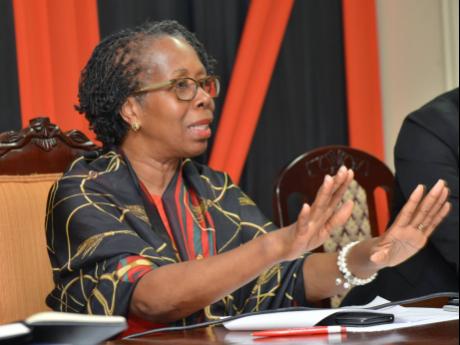Foster-Allen warns of grief if COVID learning gap not reversed
Elaine Foster-Allen, former permanent secretary in the Ministry of Education, has added her voice to warnings that the estimated 120,000 students who were missing from online classes in the height of the COVID-19 pandemic will cause grief for Jamaica.
At a forum on ‘The Future of Denominational and Trust Education in Jamaica’ last week, Foster-Allen directed her concerns to Maureen Dwyer, the acting permanent secretary in the ministry, and Dr Adrian Stokes, chairman of the Education Transformation Oversight Committee.
“Nothing short of a radical – maybe even revolutionary – approach to education at this time is going to fix it, and I say that in the context of what has happened, in particular over the past three, four, maybe five years … . We don’t know for sure how many children really suffered and continue to suffer as a result of what took place during the pandemic,” she said.
“Really and truly, what is the framework? What is the context? What do we really want for our children?” continued Foster-Allen, a former teacher and public service administrator. “The 200,000 children or 20,000 or 40,000 and more who have gone missing, they are going to cause us grief, and if one of us suffers, all suffer.”
The forum was primarily organised for the Ecumenical Education Committee to give feedback to government representatives and discuss the way forward for Jamaica’s education sector based on the report of the Professor Orlando Patterson-led Education Transformation Commission.
The ministry has prioritised 54 of the report’s recommendations addressing governance and accountability, early childhood education, teaching curriculum and teacher training, tertiary education, technical and vocational education and training, infrastructure and technology, finance, and other areas.
EQUALITY VS EQUITY
During her remarks, Foster-Allen also focused on the equality versus equity issue in the report.
“There is massive confusion because, let me take, for example, the recommendations about upgrading tertiary-level institutions … . While there are pronouncements about equality, the framework, the philosophical underpinning is not about equity. It is about competition, and at this time, we really can do without competition,” she said.
“We need to have processes that really speak to equity and making our system equitable, and at this time, Maureen, mi sorry fi yu! And mi sorry fi many of unnu weh inna di ministry because it does not look good out here, and I suffer with you and with everybody else,” Foster-Allen said.
She added that Stokes, whose committee is tasked with monitoring execution of the recommendations of the report, had a “hard job” to do.
“But what yuh going to do is not going to be done and impact the least among our children in the way in which they need to be impacted, liberated, transformed [if it is] short of a miraculous revolutionary approach to education in this country,” she said.
“A revolution is needed in education,” Stokes responded, “or you could say a transformation is needed, which is what this committee is about in terms of overseeing the implementation of recommendations.”
Dwyer said she was listening to all of the concerns of the persons speaking at the forum.
“We’re are now in the throes of thinking through and working through how we’re going to respond as a ministry and how we implement what’s implementable … . We recognise and want to thank you for your contribution to the sector,” she said.

